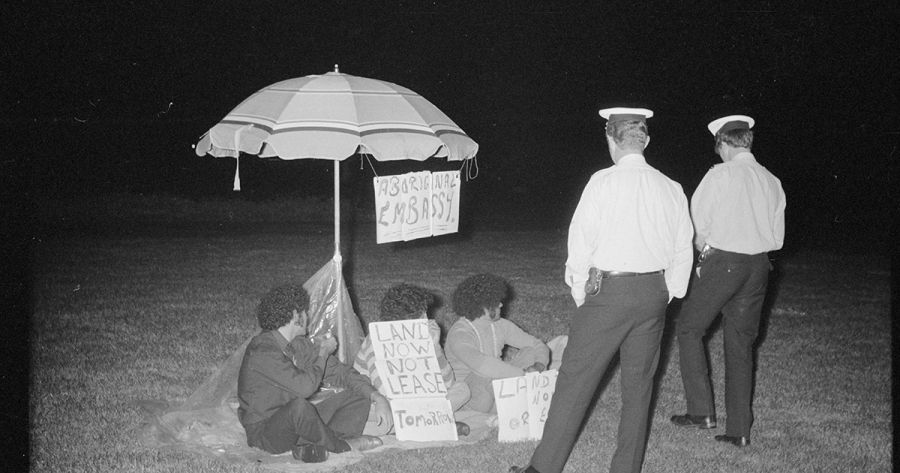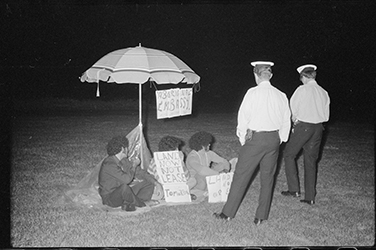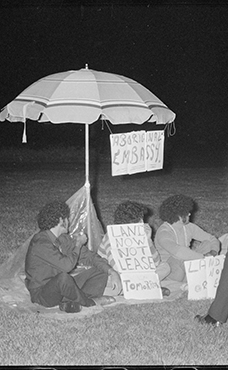
- Free Article: No
- Contents Category: Commentary
- Custom Article Title: Turning a blind eye
- Review Article: Yes
- Article Title: Turning a blind eye
- Article Subtitle: The referendum and the burden of history
- Online Only: No
- Custom Highlight Text:
The defeat of the proposal in the recent Aboriginal constitutional referendum was unsurprising given the forces at work, which I discussed in ‘A Referendum in Trouble’ (ABR, July 2023). Most importantly, it lacked the support of the Liberal and National parties once their leaders decided to oppose it, largely for partisan purposes.
- Featured Image (400px * 250px):

- Alt Tag (Featured Image): Bain Attwood on the referendum's burden of history
The fact that the advocates of constitutional change pressed ahead is puzzling because the federal government knew the lesson that the history of Australian referendums has to teach, while Aboriginal leaders have long known that many non-Indigenous Australians are uneasy about granting First Nations people special rights based on their indigeneity and that it is much easier to persuade a court, rather than the people, of the truth and justice of their historical claims.
One factor, no doubt, was the Yes campaigners’ commitment to the cause of recognising the First Nations in what they deemed to be Australia’s foundational document, and their belief that amending it would ensure there would always be an Indigenous body advising government on matters concerning Indigenous people. But I doubt this is a satisfactory explanation. More likely, it can be attributed to an intersection between this and several other factors.
The first is an excessive degree of presentism such that the horizon of the present comes to be seen as the only horizon available to us. This state of mind means we lose sight of the fact that the past had other ways of knowing the world. In recent times, historians around the globe have observed an upturn in presentism. In this case the government’s principal figures, having persuaded themselves that the Labor Party had won a resounding victory in the 2022 federal election despite the fact that its vote was the lowest since the Great Depression, seem to have convinced themselves that the early opinion polls meant that the referendum proposal had a very good chance of succeeding, despite knowing that the level of support for any referendum proposal declines markedly once campaigning for the No case begins. In short, it appears that the principal Yes campaigners were unable to consider the wisdom that the horizon of the past was offering.
Another factor is denial, that paradoxical state in which a human being knows and yet is unable to acknowledge what they know because it is too disturbing or threatening, which means that that knowledge is repressed or reinterpreted, or registered well enough but its implications evaded or ignored. It appears that the passionate commitment of the Yes campaigners meant they were unable to seriously contemplate the implications of their knowledge about the history of Australian referenda and so turned a blind eye to it. (Presumably a more profound form of denial – in regard to Australia’s black history – was also at work among some of those who voted No.)
A further factor seems to have been an undue degree of subjectivism, that is, a tendency to place too much emphasis on the importance of one’s own particular feelings, perspectives, experiences, and beliefs, and/or those of other people, and a corresponding tendency to discount the value – and sometimes even the possibility – of distancing oneself to some degree from a subject matter so that one can acquire critical knowledge of a relatively objective kind. Many non-Indigenous Australians, inside and outside government, have come to conceive of their position in regard to Aboriginal people, and especially this country’s black history, largely in terms of the task of listening to Aboriginal people’s truth-telling. Not surprisingly perhaps, this was writ large in the case of the referendum, given its key demand: the Voice. But while listening to what Aboriginal people have to tell is vital, the way this task has been conceptualised makes it difficult for government, as well as many non-Indigenous Australians, to engage in robust argument with Indigenous people. In this case, it is known that operational matters were determined by a governmental referendum advisory group that was dominated by key Aboriginal campaigners and by those figures acting alone. At the same time, it appears that no public servant of any standing provided advice that might have given the Yes campaigners considerable pause for thought. Consequently, subjective forces that had largely and appropriately led the government to commit itself to holding the referendum largely determined what it did.
In summary, it seems that the intersection of the factors I have discussed means that the government and the Aboriginal leaders of the Yes case might never have seriously weighed up the pros and cons of proceeding with the referendum without the bipartisan support that all referendums have required in order to succeed.
If the forces I have discussed explain what happened, this probably has implications for what government does next in response to the Uluru Statement from the Heart.
In my opinion, government must understand the rationale that informs the Statement’s call for a national truth-telling commission so that it is clear about its purposes and can assess whether they are likely to be fulfilled. (It appears that Victoria’s Yoorrook Justice Commission is doing some vital work by dint of its forensic analysis of contemporary matters rather than its historical truth-telling hearings.) This is necessary because the epistemological, psychological, and ethical assumptions that inform the Statement are only implicit in it.
In the way the proposed truth-telling commission is often presented or received, it appears to rest on a series of assumptions that are probably flawed. First, it seems to be assumed that this country remains in the grip of what, in 1968, the anthropologist W.E.H. Stanner called ‘the great Australian silence’ about Australia’s black history, even though there has been a great deal of truth told about it, especially, but by no means only, in the past fifty or so years; and/or that the recovery and recitation of the facts about this past will alone persuade the majority of Australians to support governmental programs to redress its legacies, despite evidence to the contrary.
Second, it seems to be assumed that the work of truth-telling can be performed by Indigenous people giving testimony about the past, in the form of personal or collective memory, and that this can replace history (by which I mean scholarly historical knowledge), whereas once upon a time memory was merely regarded by many as just a useful supplement, or occasionally a helpful corrective, to it.
Third, it seems to be assumed that one can reasonably expect all Australians to embrace the truth that such a commission will present about Australia’s black past, and so adopt what the Council for Aboriginal Reconciliation once called a ‘shared history’. But it is almost certainly utopian to expect a nation’s people to transcend the pull of their respective identities to accept a body of facts about its past. As the Canadian scholar Michael Ignatieff pointed out many years ago, ‘what you believe to be true depends, in some measure, on who you believe yourself to be … [People] do not easily or readily surrender the premises upon which their lives are based.’ The project of ‘shared history’ stands in contrast to that of ‘sharing histories’. The latter assumes and accepts that histories are told by Australians who are differently situated and who produce different kinds of knowledge about the past. It acknowledges that the histories we tell depend not only on who we are but on our purpose in telling them, the circumstances in which we do so, and the forms or genre we use to tell them. It makes plain that the conjunction between past and present is the ground upon which all history-telling occurs, thereby prompting reflection about the nature of the relationship we have to the histories we tell, hear, read, or see. This can reveal that all historical knowledge is, to some degree, a matter of perspective and interpretation, and that no one has a monopoly on historical truth. It does not hold that all historical accounts are equal or that anything goes, but simply recognises that the most significant parts of any historical narrative are always partial and so the knowledge they provide is a limited good.
Consequently, sharing histories can be a place of vigorous but, one hopes, courteous discussion, dialogue, and debate. It assumes that Australia is peopled by groups with diverse histories and identities, recognises that ongoing conflict cannot be avoided but can be limited, and recommends that this situation be accepted, however unsettling that might be. In other words, it accepts that national communities do not require all historical conflicts to be resolved or consensus reached, and that it is better to admit the ongoing presence of different histories and seek to accommodate them through a practical and ethical commitment to democratic principles that includes respect for the rights of all citizens.
Finally, it seems to be assumed that the South African Truth and Reconciliation Commission provides a model for an Australian truth-telling commission. Let’s put aside the fact the truth commissions tend to be short-lived events and that the differences between the historical moment in which the TRC was held and that in which the proposed commission here would take place are greater than the similarities. One would want to be sure that the conditions that meant the TRC was relatively successful in its work could be reproduced here. Fundamental to its work was, the sociologist Deborah Posel points out, an approach that sought to ensure that there was, simultaneously, multiperspectival and subjective eyewitness testimony; inter-subjective encounters (preferably but not necessarily face-to-face) between truth-tellers and listeners on a large scale; and objective checking of the testimony presented. In addition, the TRC’s work was informed by a sophisticated typology of the concept of truth that was devised, in Posel’s words, ‘to straddle and reconcile subjectivist and objectivist notions of truth’.
If these conditions cannot be met, there are good reasons to doubt that the purposes the Uluru Statement has in mind for a truth-telling commission would be realised. Given this, one might ask whether at least some of its purposes could be met by other means.
Given that the TRC is an example of what the Canadian philosopher Charles Taylor has called ‘negative commemoration’ (in contrast with the more familiar ‘positive commemoration’ that often comprises monuments to heroes and the like), are there other forms of this practice that could be adopted? For example, if the existing National Sorry Day became an officially mandated annual national (holy) day of mourning (not unlike Anzac), could it serve one or more of the purposes of the proposed truth-telling commission and in an ongoing manner?
In respect of the making of a contemporary treaty for which the truth-telling commission is seen as a necessary precursor, two points might be noted. The growing emphasis many Aboriginal communities are placing on their status as local First Nations, and the example of other countries such as Canada or more specifically British Columbia, suggest that it would be wise, at least for the time being, for the federal parliamentary Labor Party to commit itself to treaty-making at the state rather than the national level.
Last and perhaps most importantly, the results of the referendum, like those of the most recent federal election, suggest that there is another pressing need. While the particularist politics that has informed the politics of recognition or the politics of difference in the past few decades was and is a necessary corrective to universalist politics that ride roughshod over the importance of recognising the significance of differences grounded in race, gender, sexuality, and so forth, it must be reconnected to a politics of redistribution so that progressive forces can serve the needs of all the oppressed.
This article is one of a series of ABR commentaries on cultural and political subjects being funded by the Copyright Agency’s Cultural Fund.



Comments powered by CComment